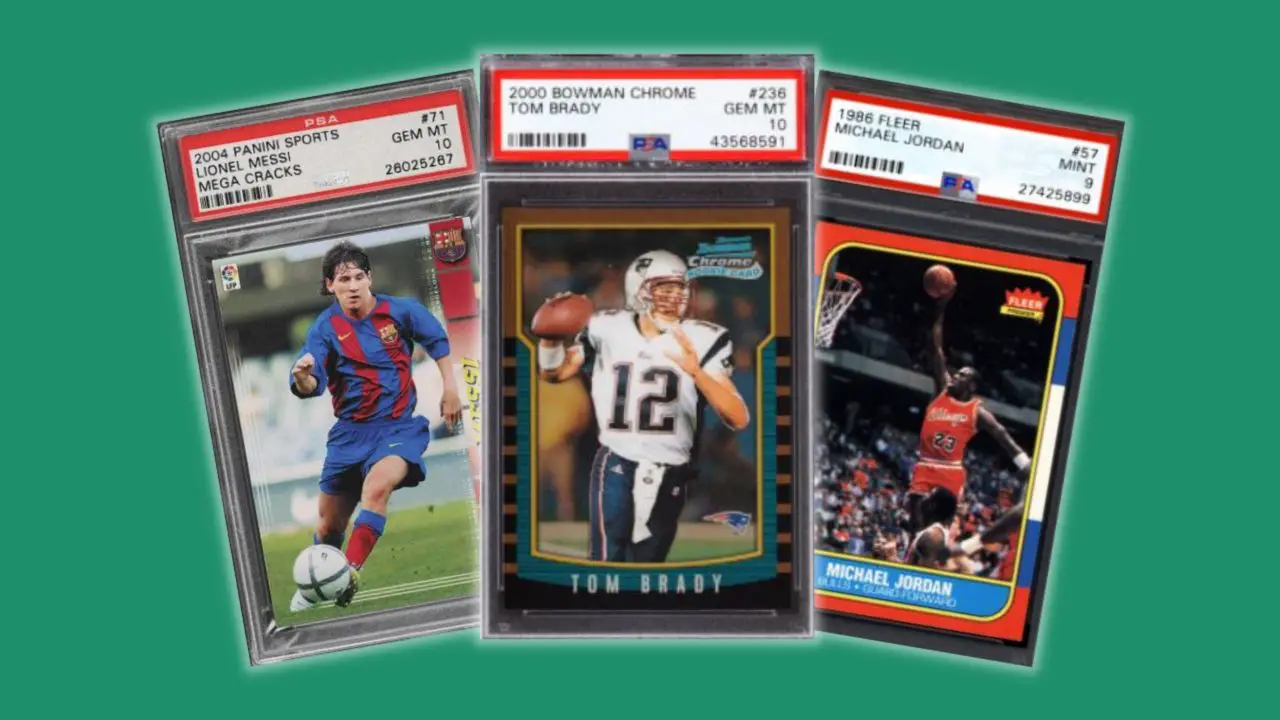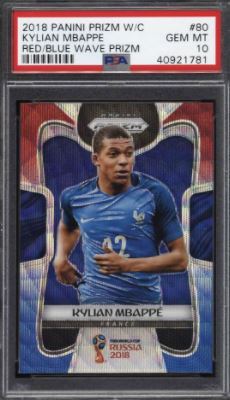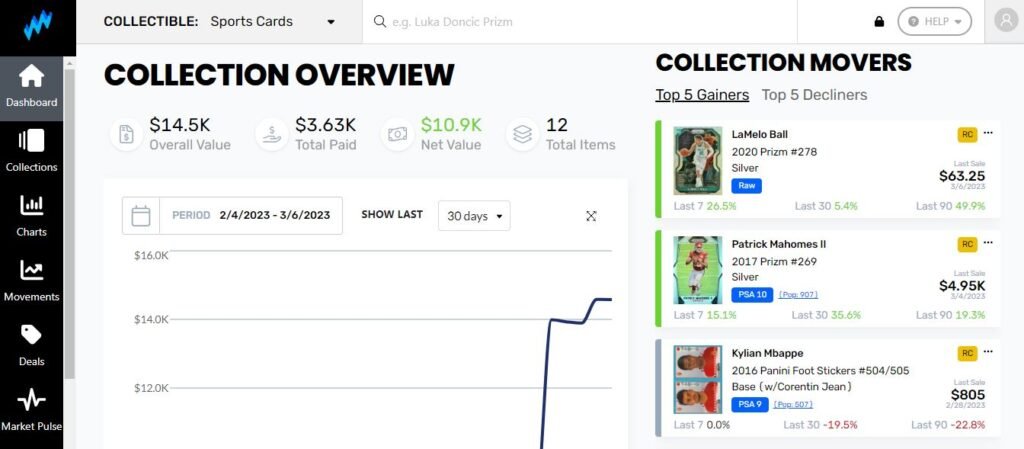
For some, collecting cards is all about the nostalgia of a childhood hobby or a passion for their chosen sport.
But for others, it’s about investing in cards and making a profit – buying cards and flipping them for more.
So, can you make money buying and selling sports cards? The short answer is yes you can, but it’s important to be aware of a few things.
I’ve gone through some tips and things to know, below.
Table of Contents
Recommended Tool:
Market Movers
There’s no better tool for sports card investors, with endless data and graphs for both the overall market, and specific cards. Track your sports card portfolio easily in one place.
How Do You Make Money With Sports Cards?
You Have To Educate Yourself First
Before buying any sports card that you plan to flip for a profit, you must know what you’re looking for.
I often see people online asking how to make money from their extensive knowledge of a sport. Well, sports card trading is a great way to do that.
Knowing which player is having a great season or is about to be the next world star can be used to your advantage in terms of subsequent rising sports card values.
How well do you know the sport and the market? Get to know which players or cards are popular now, the players that are likely to grow in popularity, what they’re worth now and so on.
If you want to make money from sports cards, you’ll need to know the market.
Also, have you considered which strategy works best for you? You can either take a gamble on the rookie card who maybe has a bright future or invest in the icons of whatever sport you’re into.
Some people buy cards and hold short term for quick profit, and for some it’s a case of buying and holding as more of a long term investment.
Another approach is to buy raw (ungraded) cards that you recognize could grade highly, get them graded, and sell for a profit. Collectors will pay a lot more for highly graded cards than they will for raw cards.
The key to this is to learn how to accurately estimate a card’s grade by just looking at it – in most cases, judging its condition from just images on eBay. Don’t be scared to ask sellers for more pictures, with close-ups of the corners and edges, to properly assess the card’s condition.
Do some research first and find the strategy that fits your risk tolerance or patience levels.
Pick The Right Cards - Not Every Card Will Rise In Value
It’s like anything else, sports card prices are based on whatever collectors are willing to pay. Card values are tied to the laws of supply and demand.
An increase in demand will cause an increase in price, and the more rare and limited the supply, the more the price will increase.
So think about what cards will command a high demand amongst collectors.
Generally, rookie cards are more collectable, and then there’s also low numbered hits, parallels and inserts, which collectors place more value on these days – People look for scarcity and uniqueness, those are the types of card that do well in the future.
The Junk Wax Era proved to us that mass-produced (in that case overproduced) cards don’t tend to rise in value.
You also need to consider the popularity of the player featured on the sports card – Will there be demand for them in the future?
In soccer, for example, players like Kylian Mbappe or Erling Haaland are on track to be the next biggest soccer stars, taking over from Ronaldo and Messi – if the rest of their careers go as expected then their card values could skyrocket in the next 10 years.

Of course, there’s always a level of risk, a player is only one big injury away from a different future in the sport.
Established legends of the sport are a safer long-term bet, because they have that demand already, and supply of their cards will only get lower years after their careers end.
The point here is to use your knowledge of the sport to pick the cards likely to rise in value over time, but also consider the types of card that are appealing in the sports card hobby.
Don’t Panic When The Overall Sports Card Market Has The Occasional Pullback
You have to be prepared for a potential short term fall in card values, but the right cards should rise steadily over a longer period of time.
I’ll stick with soccer cards as my example – the sport has been growing in popularity in the US in the last decade and that’s only going to accelerate when the Fifa World Cup comes to America in 2026; The hype around that tournament will likely bring a new wave of collectors to the scene.
But I want to make a cautionary note that any market will experience corrections and pullbacks every so often, and the supply and demand driven sports card market is not immune from that.
The huge growth of the collectable cards market in 2020 and 2021 was partially driven by nationwide lockdowns and restrictions – all of a sudden people had more time on their hands and card collecting got more attention, but they’ll certainly be times when the hype cools for a while.
Keep A Track Of Your Sports Card Investments
I’d suggest keeping a record of your sports card investments, so you can easily see what you have, and know if it’s time to sell with current valuations. This can get tough to do as your collection grows.
A simple spreadsheet can serve that purpose but, for me, it ended up becoming too manual and time-consuming.
A useful tip is to use the completed and sold items filter on eBay searches, it allows you to see what the last auction of a card finished at, so you can manually track values.
To make things much easier and automated, I now use a tool called Market Movers, which is a collection management tool with a huge pricing database and market intelligence – It allows you to see the current values of cards in your portfolio based on recent sales data from online auction sites, all in one place.
You can try Market Movers free using the code: TRIAL
Where Can You Sell Sports Cards?
There are many different places to sell your sports cards.
Most people know of eBay these days, for me it’s the easiest way to auction sports cards and it’s what I mostly use.
The platform makes direct communication easy for any potential buyer and with plenty of buyer/seller protections as well as its pretty seamless process, it makes for a convenient and safe option to sell your cards.
For any more valuable, high-ticket sports cards, I’d recommend using a more specialized auction site, such as the well-known Goldin Auctions who specialize in auctioning sports memorabilia and collectables.
Final Thoughts
If you take the time to educate yourself, there’s money to be made flipping sports cards.
As I mentioned earlier, you have to find the strategy that works best for you – I personally buy to hold long term and look at icons and the emerging rookies as I believe they’ll be a steady rise over the next 5-10 years.


